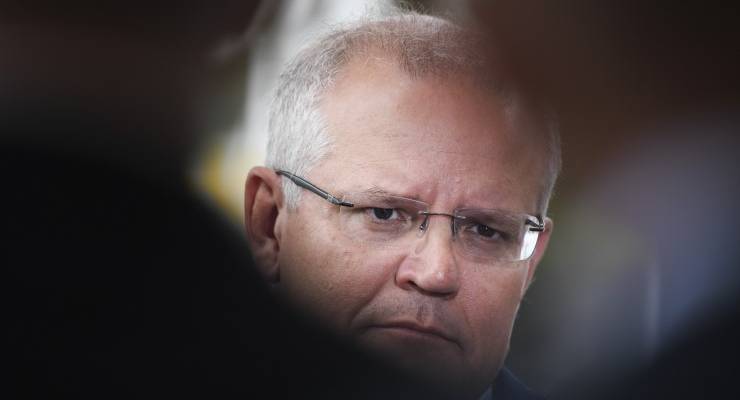
Australia likes to hold itself up as a beacon of governance in our region and around the world. We’re spending nearly $800 million in foreign aid on effective governance this financial year, because “effective governance is one of the six priority areas in Australia’s aid policy”.
We’re eager to help less developed countries “reform institutions to strengthen regulation and delivery of public services and deliver more representative and accountable government” and “build effective law and justice systems”.
Perhaps our diplomats and aid delivery bureaucrats can spend some time in Canberra doing the same, because our federal government is indistinguishable from many of the countries we lecture about transparency and governance. We’ve got the governance standards of a banana republic. Let’s run through a brief list:
- A “revolving door” for politicians and senior bureaucrats that sees Martin Ferguson, Ian Macfarlane, Christopher Pyne and Julie Bishop — to name only the most recent and high-profile examples — move seamlessly from regulating and handing out grants in a sector to working for and with companies in that sector
- Routine interference by a minister in the agriculture portfolio to benefit major vested interests such as irrigators, agricultural companies and live exporters
- Lobbying by senior ministers to potentially benefit companies part-owned by colleagues
- Police raids on media outlets and journalists that have embarrassed powerful figures within the government
- Security agencies that operate in secret with no parliamentary oversight
- Prosecutions of whistleblowers who have revealed criminal conduct and wrongdoing
- A minister and a departmental secretary ordering spying on the cabinet of a small neighbour to benefit an Australian corporation, then later taking roles with the same corporation — and the bugging and prosecution of the intelligence official who exposed it, and his lawyer
- Routine commercial espionage against neighbours and allies designed to benefit Australian and US companies
- Minimal transparency for donations made to political parties, and no penalties for non-compliance
- No federal integrity commission and no likelihood of one for years;
- Major political donors obtaining large contracts to provide policy and management services within the public service
- Media law changes designed to serve the interests of major media proprietors and defamation laws designed to protect the powerful from scrutiny.
Let’s engage in a thought experiment: read that list and imagine if you read it in relation to, say, Malaysia or Indonesia or one of our Pacific neighbours. What would your reaction be? That this is what we can expect from a developing country? That they clearly don’t have the kind of integrity and governance safeguards that we in the West take for granted? That we’re lucky things aren’t like that here?
Maybe our politicians and senior public servants should receive an aid package explaining the importance of governance and how to “deliver more representative and accountable government”.








Perhaps the Americans could help. Oh, perhaps not. The British? Not really. Italy? The Cradle of Democracy, Greece? Iceland?
It certainly is a race to the bottom for many western democracies. Not sure why you have Iceland in this rogues gallery however. I’d say Iceland could definitely help – they are the country that jails corrupt bankers after all.
Iceland’s not so much a member of the rogues’ gallery, more as a last resort after eliminating others.
Ah, I get it. Apologies for misunderstanding. In that case I say we should definitely petition the Australian government to seek governance training and assistance from Iceland 🙂
Perhaps their remaining banks could help to straighten ours out.
WOW! Bernard…great stuff!
However…please tell me you don’t think the Feds are the only ones in Oz who do this kinda thing.
NSW government perhaps???!!! Or any of the other ‘Coalition/Liberal’ state governments around the place?
I would say it is a dead certainty!
“Timor Leste, we’re here to help, and we brought Woodside.”
…… What’s the difference?
“We’re spending nearly $800 million in foreign aid on effective governance this financial year, because “effective governance is one of the six priority areas in Australia’s aid policy”.”
How much is getting through to where it’s needed. Surely the government isn’t keeping it all for themselves until they can demonstrate “effective governance” themselves. They perhaps ought to.
All true Bernard. Australia is as venal as the next country. But you try to use the word “corrupt” in a comment on an article in Nine/Fairfax papers and you get moderated straight to the bin. They won’t even let you say a process has been corrupted. I guess this segues straight to the defamation laws, which effectively protect corruption.
And if you use the word “corrupt” in Crikey comments, it’s straight to the moderator too.
And, as I recently discovered, “defamation“even when it was in a cut’n’paste from the Savva article.
See!
SteSpe esp, & other commenters, note that this took four days to pass through the Beast’s viscera & entrails.